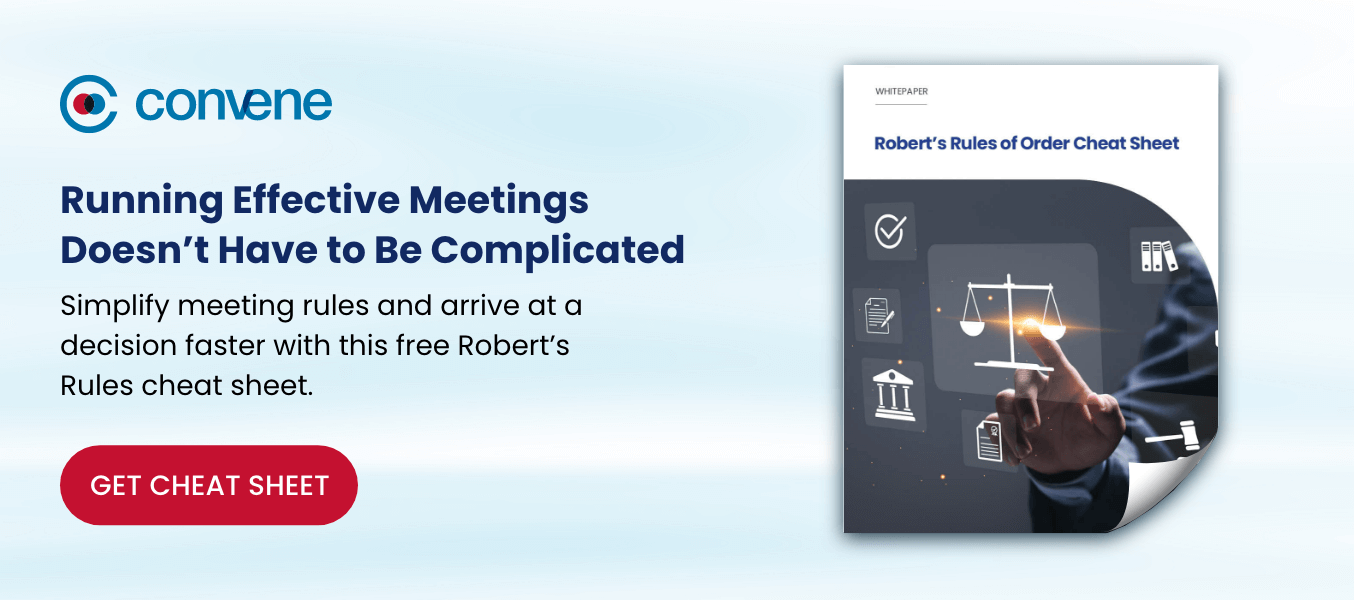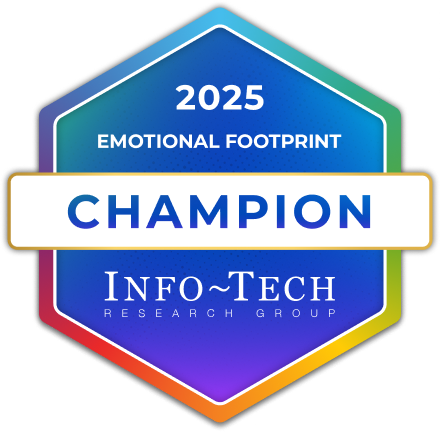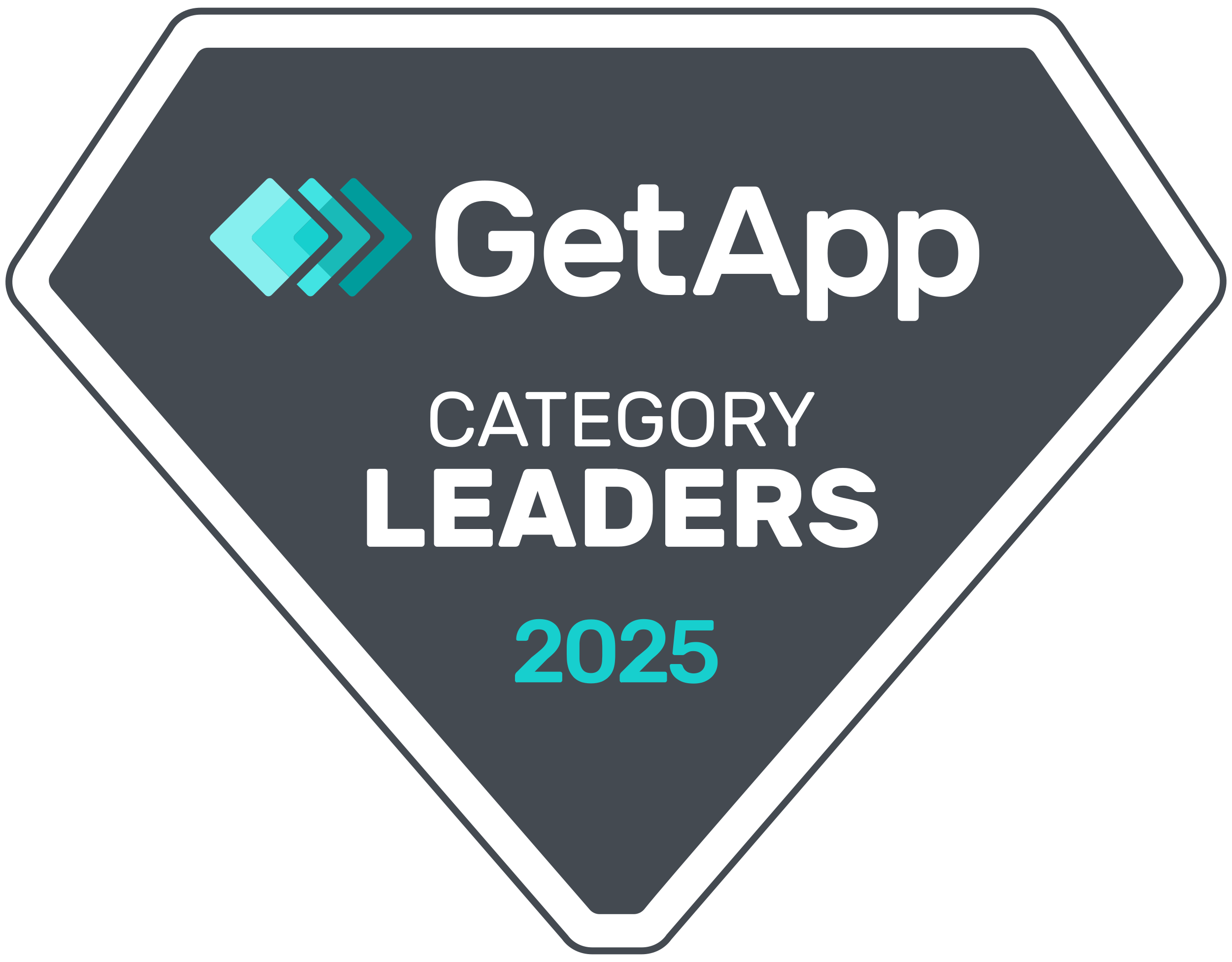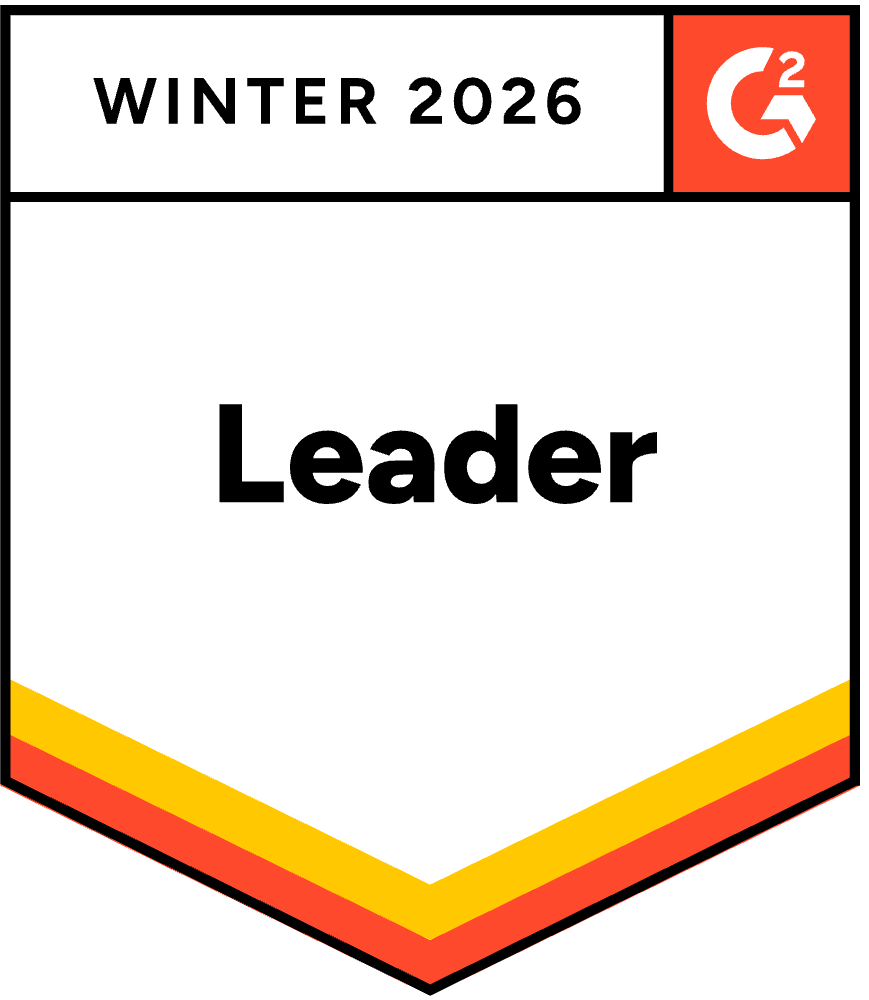The time spent in meetings has been rising by up to 10% over the past 20 years. This is why modern boards are imposing to have agenda-driven meetings that waste no one’s valuable time. A typical board meeting agenda not only set topics or priorities, but also keep the board focused on what needs to be addressed.
In this article, we will explore more about its importance, and how to create a meeting agenda that doesn’t waste your participants’ time.
What is a meeting agenda?
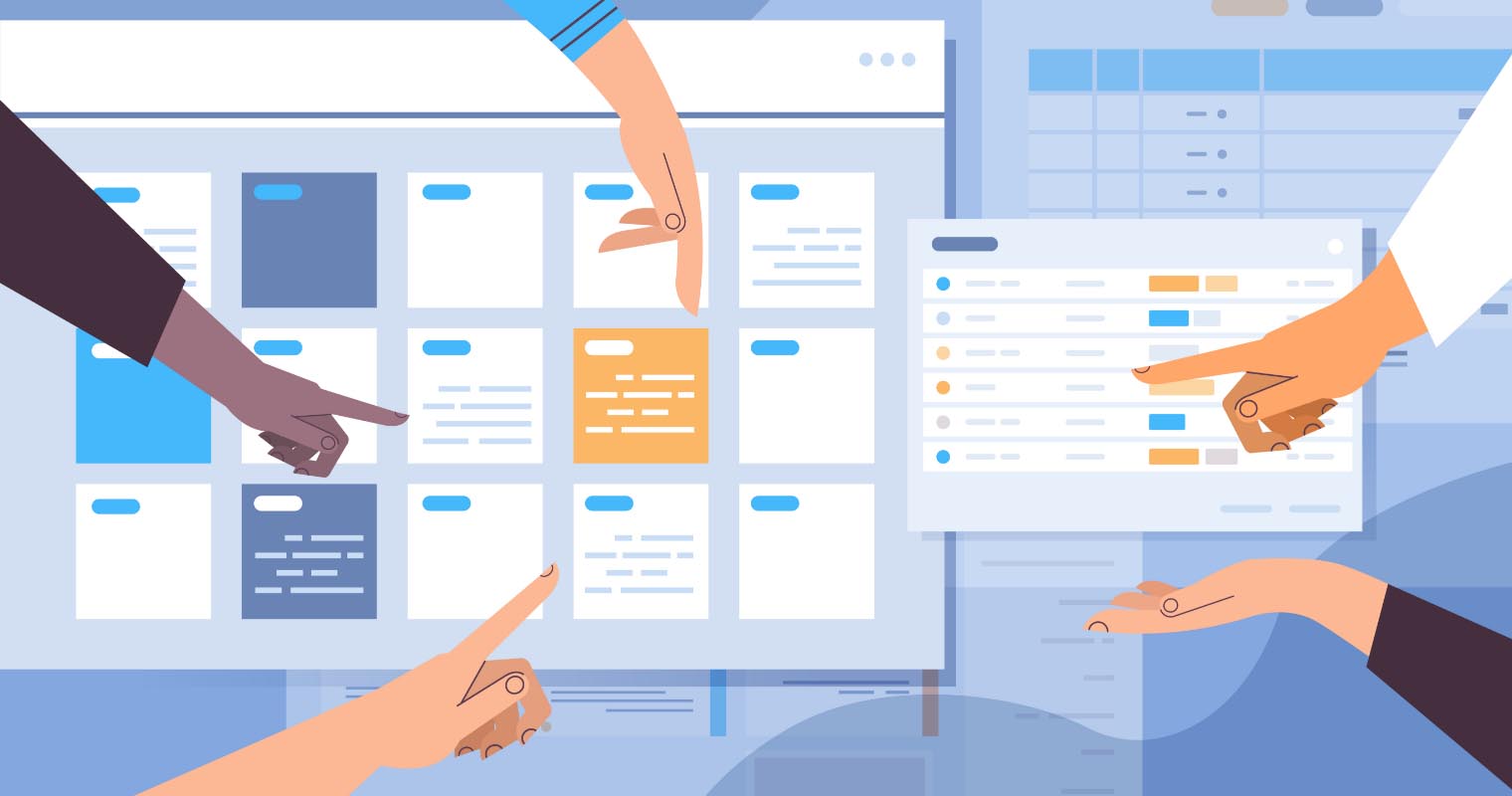
A board meeting agenda is a document that outlines the topics to be discussed, and the order or time in which they will be addressed. According to studies, agenda-driven meetings guarantee productive discussions and timely decisions. A typical board meeting agenda may include items such as financial reports, strategic initiatives, governance matters, and operational updates.
Why having a meeting agenda important?
An agenda is crucial for establishing a clear purpose and structure for the meeting. It allows the attendees to better understand the meeting’s objectives and what’s expected of them. According to a Doodle survey, 67% of respondents agree that having a clear agenda is what makes a good meeting. Not only does a clear agenda promotes a cohesive discussion, but also allows everyone to prep ahead of time without wasting time.
A meeting agenda can help ensure time for each topic is allocated appropriately. This prevents discussions from becoming overly prolonged or neglected during the meeting. Also, it ensures that the board will come to essential decisions in a timely manner.
How to Create an Effective Board Meeting Agenda
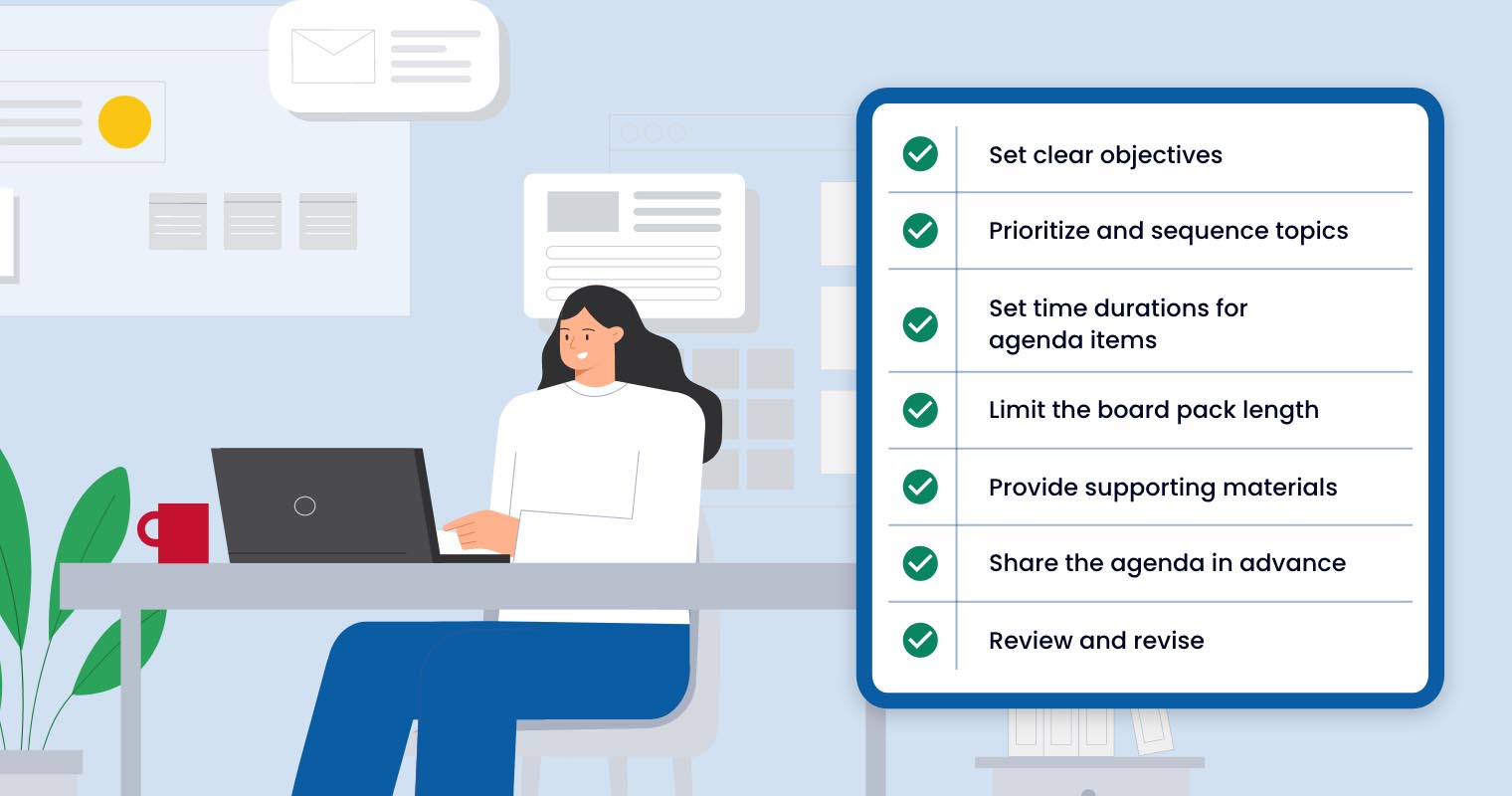
A typical board meeting agenda not only outlines the topics, but also sets the time and flow of the entire discussion. It basically helps provide a seamless and productive experience for the meeting participants. To guide you, here are seven steps to create an effective board meeting agenda that lead to impactful discussions.
1. Set clear objectives
Define the purpose and desired outcomes of the meeting. Identify the key board meeting topics that align with the company’s goals and focus on addressing them. If the objective is to review and approve the annual budget, the agenda should reflect this goal. You may include relevant budget presentations, financial reports, and discussions related to budget allocation and financial projections. To have a better idea, it’s best to find board meeting agenda samples that you can use as references.
2. Prioritize and sequence topics
Arrange agenda items based on their urgency, importance, and logical flow. Start with critical or time-sensitive matters, followed by topics that build upon each other. Sequencing board meeting topics in a logical order can be done by addressing strategic initiatives before operational updates.
3. Set time durations for agenda items
Allocate specific time limits to each agenda item to ensure productive discussions. Be realistic with your estimates and allow flexibility for discussion. Time constraints help maintain focus and prevent discussions from becoming overly prolonged, ensuring that all agenda items are covered.
4. Limit the board pack length
Avoid overwhelming board members with excessive information. Include essential materials and relevant background information, such as concise reports, key performance indicators, and summaries of industry trends. For example, rather than including lengthy market research reports, provide a brief summary with key findings. You can attach the full report as an optional reference for interested board members.
5. Provide supporting materials
Only include supporting materials that are directly relevant to the agenda items. For example, if the agenda includes a proposal for a new partnership, attach a summary of the partnership agreement, financial implications, and any related due diligence reports. Providing such materials enables board members to make informed decisions during the meeting.
6. Share the agenda in advance
Distribute the agenda well ahead of the meeting, allowing board members ample time to review the topics and prepare. It’s best to share the agenda at least one week prior to the scheduled meeting. This gives attendees enough time to review the board meeting topics and documents and prepare themselves.
7. Review and revise
Regularly assess your agenda creation process. Seek feedback from the board on the agenda’s effectiveness and gather suggestions for improvements. After each board meeting, solicit feedback on the clarity of agenda items, the adequacy of time allocations, and the overall meeting flow. Use this feedback to refine future agendas and make continuous improvements.
By following these guidelines, you can create an effective board meeting agenda that fosters productive discussions, informed decision-making, and successful governance within your organization.
What to Include in Your Board Meeting Agenda
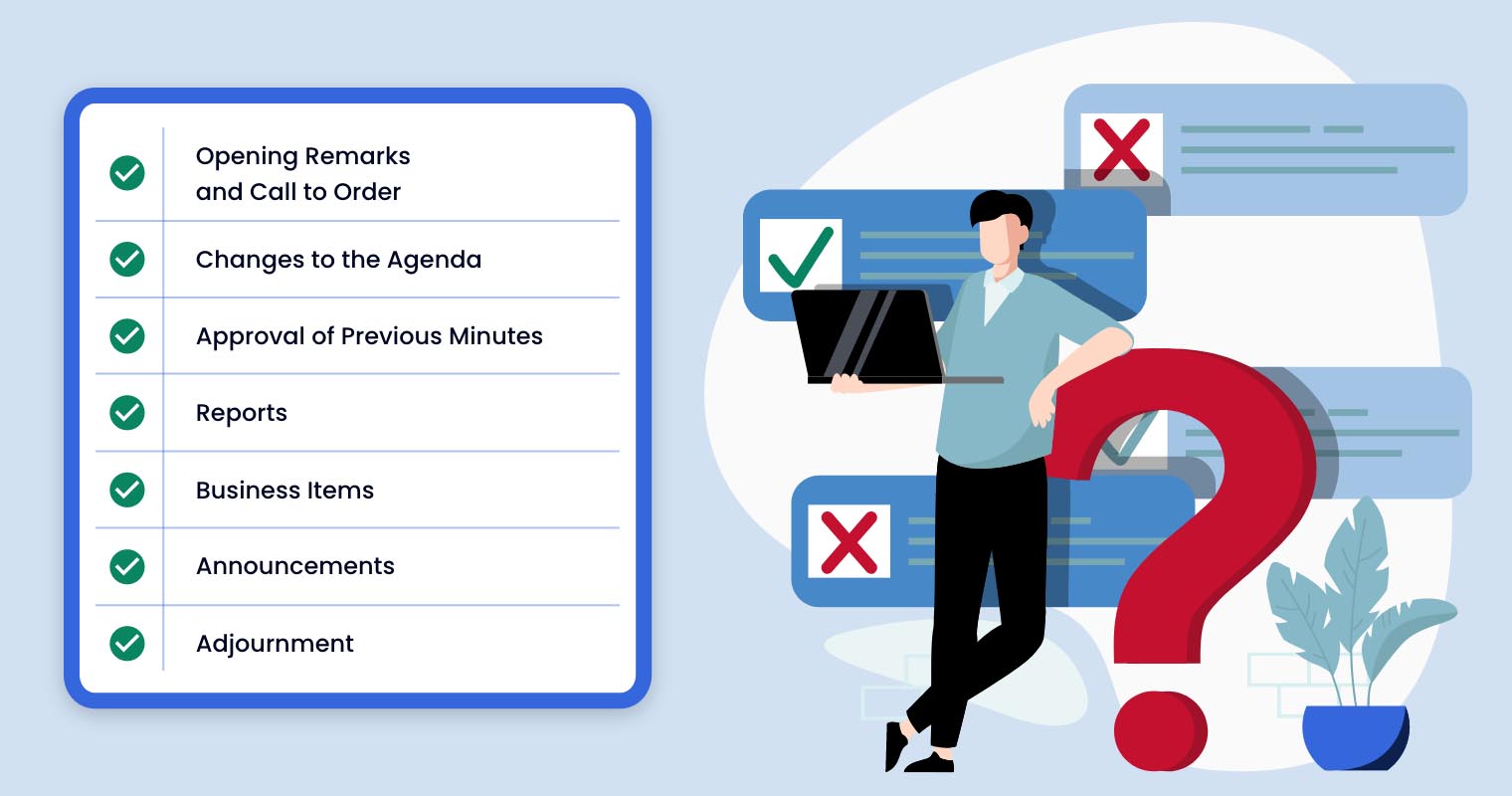
A well-structured agenda can serve as a blueprint for the meeting. It outlines the topics up for discussion and the order in which they need to be addressed. In this section, we will explore the key components to incorporate into your board meeting agenda template:
- Opening Remarks and Call to Order: This is where you can welcome board members and set the tone for the meeting. The call to order signifies the official start of the proceedings.
- Changes to the Agenda: Review and discuss any changes to the agenda requested by board members or the board chair.
- Approval of Previous Minutes: Board members should have received the minutes in advance for review. Any corrections or clarifications can be addressed during this discussion.
- Reports: This includes reports from various committees, board members, or executives as appropriate. Examples are CEO Report, Finance Committee Report, Marketing Update, and Human Resources Update.
- Business Items: Include a segment for old business items that require follow-ups such as ongoing projects or action items. Additionally, have a segment for new business items, which may involve proposing and discussing new strategies or initiatives.
- Announcements: This section includes board members’ announcements, upcoming events, and key organizational milestones.
- Adjournment: Set the date and time for the next board meeting. Adjourn the meeting.
How Convene Helps Create Effective Board Meeting Agendas
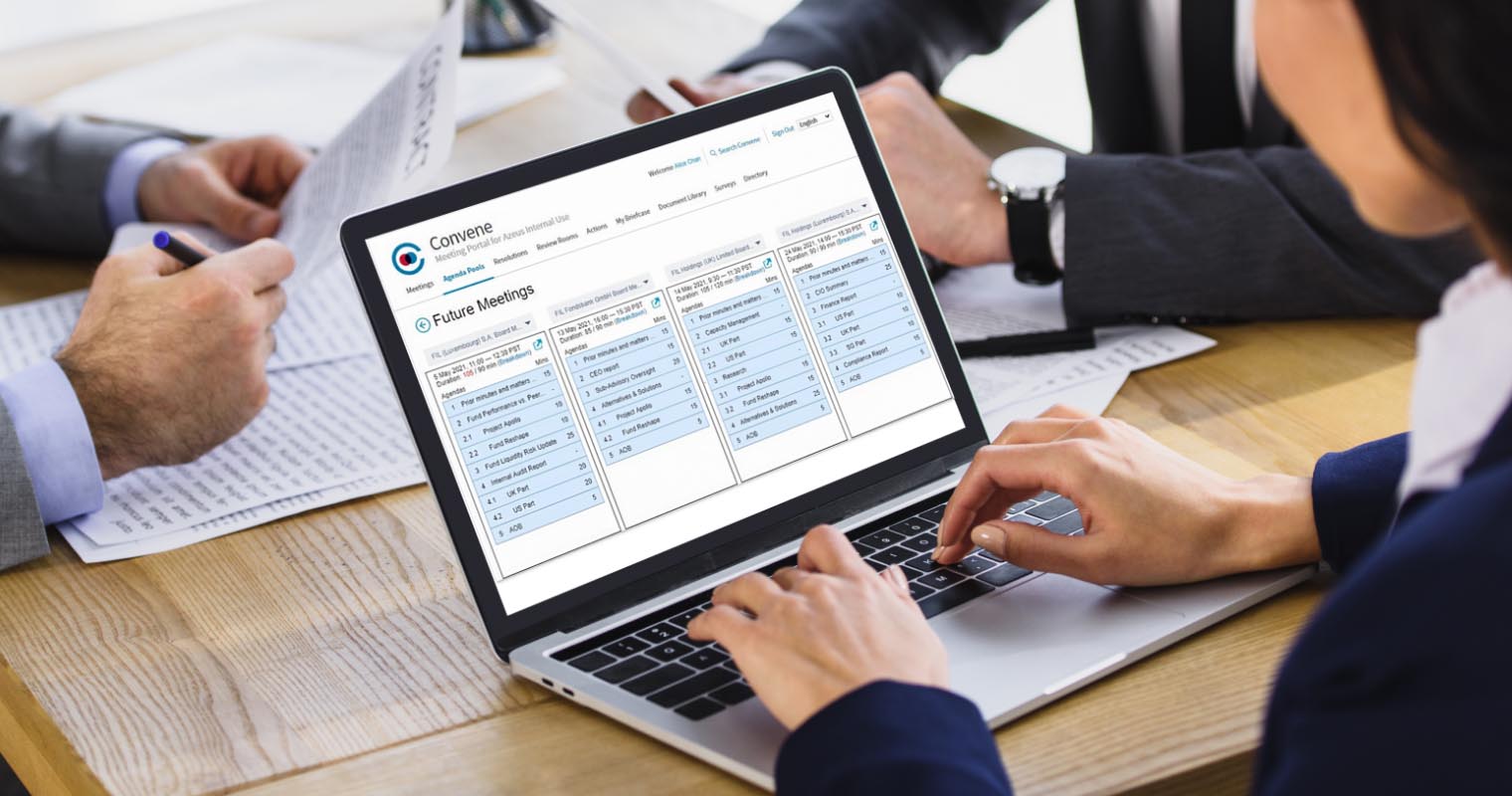
Creating meeting agendas requires meticulous organization and coordination. But the complexity of managing various agenda items and meeting schedules can be eased out by using the right board portal solution.
Convene, a leading board portal software, serves as a central hub for the entire board meeting process, including agenda creation. Administrators can easily manage agenda items across multiple meetings from a single platform. This simplifies the coordination of agenda components, such as attachments, presenter information, and time allocations.
Here are some amazing perks Convene’s Agenda Planner has to offer:
- Agenda Building via Drag-and-Drop — Easily organize and rearrange agenda items using the drag-and-drop tool for optimized flow and sequencing.
- Agenda Item Tagging — Classify and categorize agenda items using tags, enabling efficient organization and easier retrieval of information for future reference.
- Export Efficiency Reports — Generate efficiency reports to review and analyze meeting performance, including tracking the time allocated for each agenda item.
- Agenda Analytics Reports — Gain valuable insights into board meeting trends, participation levels, and agenda item durations through comprehensive analytics reports
Learn more about how Convene can streamline your effective board meeting agenda creation. Book a demo now!
Jielynne is a Content Marketing Writer at Convene. With over six years of professional writing experience, she has worked with several SEO and digital marketing agencies, both local and international. She strives in crafting clear marketing copies and creative content for various platforms of Convene, such as the website and social media. Jielynne displays a decided lack of knowledge about football and calculus, but proudly aces in literary arts and corporate governance.


